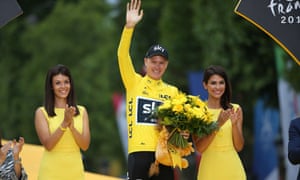This summer, the athletics World Championships, men’s and women’s cricket, the Lions tour of New Zealand and Wimbledon have shown that the British public has an enduring passion for top level sport. We have the richest football league in the world, more major stadiums per capita than anywhere on Earth, and are widely credited with having staged the greatest Olympic Games of the modern era. Sport is a massive part of our life and our brand as a nation.
But sport is not immune from the mistrust that has undermined faith in other big institutions such as politics, business, religion and the media. On the surface, sport can feel secure. Fifa has faced corruption allegations for years, but football’s appeal and riches appear to keep growing. Cycling has a long, dark doping shadow, yet the crowds following Chris Froome’s triumph at this year’s Tour de France, and the global coverage, suggested a sport in robust health.
Doping’s shadow fell across last Saturday’s 100m final in London, because although the Russians had been banned for state-sponsored doping, twice-banned drug cheat Justin Gatlin ran home to beat the most popular athlete on the planet. The boos may have made people feel a little better, but the stadium was packed again the next night, the next, and the next. If there is a major sporting event, Brits will flock to watch it.
However, Fifa, the IAAF and other sports bodies would be wise not to be complacent. Evidence from Portland’s UK Sports Integrity Index suggests audiences are becoming more sensitive to reputational issues. Significantly, they are also now likely to do something about it. Over half of people surveyed indicated they will stop watching professional sports because of widespread cheating and corruption.

Dig a little deeper into the numbers, and it seems football and athletics have greatest cause for concern. More than six in 10 football fans believe that corruption is an issue in the game, while eight out of 10 athletics fans think performance-enhancing drugs are still a problem.
It may be that what some mean by corruption is a general feeling that the money now involved in football is out of control; and that the drugs issue in athletics and cycling is more an overhang from the past, than a reality still there today. The IAAF under Seb Coe did deal with Russia after all, and dealt with it well. Reputational currency in the bank. But the research shows how hard it can be to shift a negative perception once it starts to take hold.
Ultimately it is about the decisions taken, but also the manner in which they are communicated. Take the IAAF’s handling of Botswana athlete Isaac Makwala. An everyday situation – a bug doing the rounds of a venue to which people from all over the globe had flocked – was allowed to accelerate into a huge controversy in which the main complaint, of the athlete and his team, and the media, was “lack of effective communication”. Another bit of reputational currency lost.
And then as we look forward to the Fifa World Cup in Russia next year, might the dropping out of sponsors be the result not merely of the controversial decision to award the tournament to Putin, but the tipping point effect of years in which Fifa has become bloated, riddled with corruption and distant from the paying public?
Sports organisations – whether a major global sports body, or an individual club dependent on public support for survival and success – need to think more strategically, including about their communications. This means making their reputation a core part of their operations, not a by-product of external events.
It will take an awful lot for me to stop watching live sport. Indeed, this weekend I am breaking into a holiday in France to return to London for two days of athletics, and Burnley’s opening game of the season at Chelsea. But even I, fanatic though I am, did not watch the Community Shield when most years I would, have not yet been to a Test match this year, though normally I do, and gave Marseille’s opening match of the season, normally part of my holiday routine, a miss.
Maybe it is just age catching up with me. Or maybe I too am just feeling sport is in danger of losing some of its magic. All big sporting organisations and teams, not just football, need to wake up to the reality that reputational currency is of much greater value than the financial kind. Failure to do so will lead to empty seats as fans take their time, money and passions elsewhere.
• Alastair Campbell is a writer and former communications director to Tony Blair



